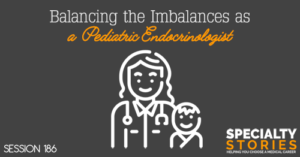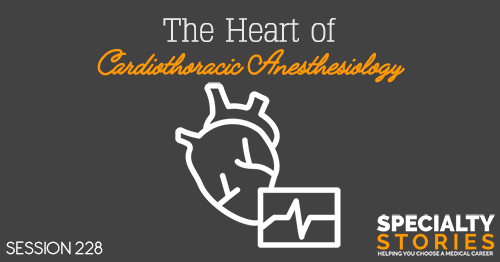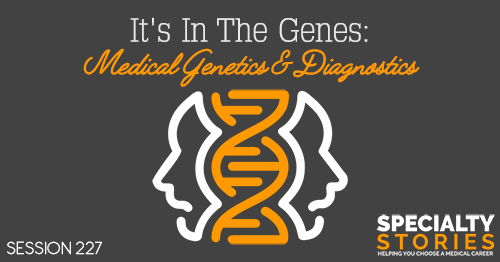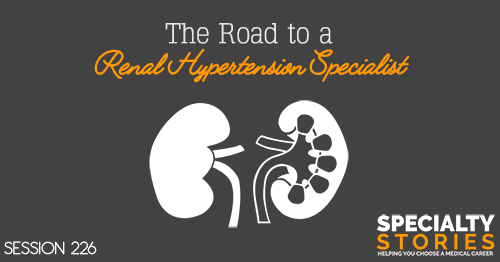Apple Podcasts | Google Podcasts
Session 186
Today, pediatric endocrinologist, Dr. Lysette Iglesias, has a great story about her journey, why she’s in private practice, and what led her to go into private practice in the Miami area. We have a great discussion about her specialty and so much more! Follow her on Instagram @drlysendocrinology
If you haven’t checked out our eshadowing program, go check it out and earn certificates for credit hours that you can put on your application.
For more podcast resources to help you with your medical school journey and beyond, check out Meded Media.
Listen to this podcast episode with the player above, or keep reading for the highlights and takeaway points.
[01:32] Interest in Pediatric Endocrinology
Lys talks about having a very good mentor who happened to be the endocrinologist at the hospital where she was doing pediatric rotation. What really drew her to the field was how the specialty covered a lot of different things from thyroid and growth to obesity and genetics. From there, she started to manage cases with her mentor.
'It's a specialty that keeps you studying every day because you always see new things.'Click To Tweet[03:20] The Biggest Myths or Misconceptions Around Pediatric Endocrinology
A lot of people are afraid of managing diabetes acidosis that might look scary when you treat them. But they see that all all the time. The degree of severity of the cases may scare some people but it’s a very beautiful specialty.
[05:01] Traits that Lead to Becoming a Good Pediatric Endocrinologist
You have to be committed to the specialty and so you have to study. You also have to come with an open mind because one person can come for one problem or multiple problems. For example, they might have a thyroid disease, but they may also have depression. So you have to be really open-minded when you’re treating a patient with an endocrine condition because it might have multiple symptoms.
And you might think it might be a certain condition, but maybe it’s not. So you have to keep thinking. A lot of questions have to be detailed and organized. Additionally, the lab result is not always something based on what you see. It might be based on age and sexual development.
'You need to put attention to the details, to be very organized, very meticulous at the time you do the physical exam.'Click To Tweet[08:22] Community vs Private Setting
Lysette moved to Miami in 2010 from New York where she studied. And she realized it’s a city that doesn’t have a lot of children’s hospitals. So she decided to jump and open her own practice.
The system forced her to open a practice because she could not find any available positions at that time. She opened her practice in February 2011 and ever since, it has been growing and growing.
[10:16] Types of Patients
Lysette sees patients with thyroid problems, either on their active hypothyroidism or overactive hyperthyroidism. And every day, she sees more and more of them because a lot of things have been changing in terms of the diet and the environment.
The same thing for obesity which has been escalating. She also sees a lot of growth problems. She treats kids with growth hormone to help them grow. She sees diabetic patients and those with elevated prolactin levels that might be due to a tumor or might be due to other reasons, like medications.
She also sees patients that have precocious puberty where they grow and develop really fast for their age, as well as patients that also develop late for their age.
Lysette explains that these hormone disruptors in our food and environment have been a problem they’re seeing for so many years now. We are consuming more processed food and there are a lot more contaminants in the environment. It’s all contributing to a lot of endocrine diseases. Lynette emphasizes the need for more research as there’s not as much compared to thousands of research about Vitamin D.
[13:30] Typical Day
Lynette currently does a lot of telemedicine. But pre-COVID, she used to see maybe 15 patients, with new patients in the morning. They either get referred by the pediatrician or by the emergency room when they diagnose something or they find that an abnormal thyroid or a diabetic gets discharged from the hospital. And so she gets a referral from pediatricians in the area.
Lynette explains they have to give a lot of time to the patient and ask a lot of questions. Unfortunately, with the way the system is, with insurance companies and more authorizations you need to do, you have definitely less time for patients.
In terms of procedure, most of the patients they see are growth hormone stimulation tests for growth and puberty.
[17:19] The Training Path
You have to do three years of pediatric residency and then three more years of pediatric endocrinology.
In terms of competitiveness, it’s not as competitive as the other competitive specialties. But you could get the position for pediatric endocrinology if you really want to go for it and put all the effort into it.
[19:37] Challenges in Private Practice
Lysette says going into private practice is not easy. It’s a long way because when you start, you have to build it up. So you have to be very patient.
Additionally, what she missed the most from the academic setting is the interaction with the other doctors. Now, she feels more isolated, especially after having to see patients the whole day.
Lysette says you have to organize your life the way you really want it. That way, you don’t end up missing the most important things.
[22:06] Life Outside of the Hospital
Lysette says you have to organize your life the way you really want it. That way, you don’t end up missing the most important things, I think you will have time for your family, you will go home, like, you know, relax, that everything has been done.
[24:10] Other Specialties They Work the Closest With
As a pediatric endocrinologist, Lysette says they work very closely with genetics. There’s a lot of overlapping with genetics developing a lot of endocrine problems. Other specialties they work the closest with include gastroenterology and radiology.
[25:35] Message to Pediatricians
Lysette says she would love to teach pediatricians in a way they could recognize what is an endocrine problem, which is something that doesn’t really need to be referred to.Sometimes, she gets referrals for abnormal thyroid function tests.
There are things that could identify cases so when they get to them, they have enough time for them to continue growing. Because sometimes, she gets referred from a pediatrician when the children are 16 or 17 and there’s no chance at that age for you to do something.
[27:46] The Most and Least Liked Things
The thing she likes the least is dealing with papers. In giving certain medication, for instance, you need to go through so many steps.
[28:46] Final Words of Wisdom
If she had to do it all over again, Lysette says she would still have chosen pediatric endocrinology.
Finally, she wishes to tell students who might be interested in this field that this specialty will help a lot of people and so it’s very rewarding.
Links:
Follow Dr. Lysette Iglesias on Instagram @drlysendocrinology
SEARCH SITE
LISTEN FOR FREE












